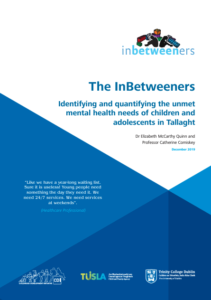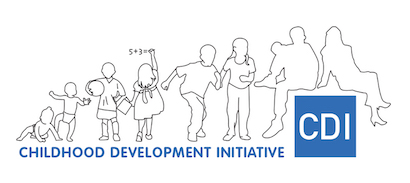CDI Nova —Youth Mental Health programme
What is the Nova Youth Mental Health programme?
The Nova programme is one of CDI’s pilot programmes, entering its second year of a three-year phase. Nova is a Youth Mental Health Programme. The name ‘Nova’ means new star, and it was born out of an idea from the project’s Youth Advisory Group. The Nova programme examines and develops a multi-layered approach to working with Emotionally Based School Avoidance (EBSA). EBSA is used for young people who may have challenges attending school due to negative feelings (such as anxiety). Young people with EBSA present with emotional and physical distress and a reluctance to attend school, which can lead to reduced attendance and further anxiety regarding school. EBSA is not a clinical diagnosis; however, it is strongly linked with difficulties in mental health. Previously, EBSA may have been referred to as ‘school refusal’ or ‘truancy’; however, this language does not fully capture the nuances of EBSA. The Nova programme is aimed at schools, parents and young people and is being coordinated by CDI in conjunction with several local and national stakeholders.
Where did the idea for the Nova Youth Mental Health programme come from?
The Inbetweeners Report, study on youth mental health among 12–18-year-olds in Tallaght identified a cohort of up to 1,500 young people with unmet mental health needs. This gap in service provision was often due to a lack of service capacity, young people not meeting access criteria, or an unclear referral pathway where the young person has more than one modality of mental health need. This research identified schools as a critical point of early intervention and access to mental health support. As outlined above, EBSA can be an indicator of underlying mental health issues. In addition, the number of young people displaying school-avoidant behaviours was reported to be increasing (McCarthy, E. and Comiskey, C., 2019). This trend has been compounded by the global COVID-19 health pandemic and its related school closures and restrictions. Having a level of anxiety about returning to school after the pandemic is completely normal for many students. For most students, transitioning back into familiar and predictable routines will ease some of this anxiety; however, additional challenges will likely be for a certain cohort of young people. The level of anxiety being experienced will mean that more intensive support, outside of those currently offered by schools, is needed for EBSA.
How does the Nova Youth Mental Health programme operate?
The Nova programme incorporates three levels of service delivery: a universal intervention, a targeted intervention, and a direct intervention in response to EBSA. This layered intervention is needed as the reasons for EBSA are often complex and multi-faceted, requiring a high level of interagency cooperation. Multiple interacting factors at the school, child, and family level may result in EBSA. Nine schools are currently involved with the Nova programme: four secondary and five primary schools. CDI also works closely with several agencies, including but not limited to:
Tusla’s Educational Support Services (TESS), the National Educational Psychology Service (NEPS) and researchers from the Global Health Department of
Who is involved with the Nova Youth Mental Health programme?
Nine schools are currently involved with the Nova programme in the Tallaght and surrounding areas. The Nova programme is fortunate to have committed partners in these schools. These schools have been identified as a result of TESS’s ongoing work with the schools.
| Primary Schools | |
| St Mark’s Senior National School, Springfield
|
https://saintmarks.ie/ |
| St Aidan’s Senior National School, Brookfield
|
https://www.staidanssns.ie/ |
| St Dominic’s National School, Millbrook Lawns | https://stdominicsnationalschool.wordpress.com/history/ |
| Firhouse Educate Together National School
|
http://www.firhouseetns.ie/ |
| St Maelruan’s Senior National School (Scoil Maelruan), Old Bawn
|
http://www.scoilmaelruainsenior.ie/ |
| Secondary Schools | |
| St Mark’s Community School, Springfield
|
https://stmarkscs.ie/ |
| St Aidan’s Community School, Brookfield
|
http://www.sacs.ie/ |
| Firhouse Educate Together Secondary School
|
http://www.firhouseetss.ie/ |
| Old Bawn Community School
|
https://oldbawncs.ie/ |
What has the Nova programme achieved so far?
As previously mentioned, Nova operates on three levels:
Universal intervention – Developing and utilising the School Avoidance Toolkit
The Nova programme operates on several levels, with one of the core elements being to provide systemic support to the nine involved schools to promote well-being and prevent and respond to EBSA in a school setting. Schools have been working closely alongside CDI to adapt existing School Avoidance Toolkits to be used within the context of Tallaght and its surrounding areas. This has been completed in consultation with a dedicated Working Group. As a result, a School and Parent Resource Pack has been created, which is available on the CDI website here (link). This resource pack will support teachers and parents in recognising the early signs of EBSA and serve as a signpost to identify existing effective resources. The CDI expects to roll out specialist training on this resource pack soon. We will also develop a version of the Toolkit specifically aimed at children and young people. This will happen in collaboration with our Youth Advisory Group. Hopefully, this Toolkit can be accessed in an interactive format over the next few months. Stay tuned!
Targeted intervention – Rolling out of FRIENDS programmes in partnering schools
The FRIENDS programmes are evidence-based complementary programmes developed by Dr Paula Barrett in Australia that aim to prevent anxiety and build resilience. Two FRIENDS programmes are currently on offer as part of the Nova programme, ‘Friends for Life’ and ‘Friends Youth’. The FRIENDS programmes help students develop resilience by teaching them effective strategies to cope with, problem-solve, and manage all kinds of emotional distress, including worry, stress, change, and anxiety. Skills learned throughout the programme help students both now and in later life. The FRIENDS intervention was chosen specifically because of its focus on building positive coping skills and reducing anxiety in schoolchildren, both indicators of EBSA. Teachers can run the programme as a whole class or small group intervention. CDI is working with NEPS and local schools to get all schools involved with the Nova programme, and trained in delivering the FRIENDS programmes in primary and secondary school settings. Most schools now have staff trained in FRIENDS and CDI is working with each school to develop an Implementation Plan.
Direct intervention – Coordinating Meitheal support for children and young people most at risk
For young people and children with an established presentation of EBSA, CDI is working with TESS to implement the Meitheal interagency approach. The Meitheal approach works well when a young person engages with more than one service at any time. As EBSA can result from a number of factors interacting together, interagency working is often necessary to address the needs at the child, family and school levels. The Meitheal model within the Nova programme will build upon existing practices for Meitheal. At present, there needs to be more effective screening for EBSA. During the Meitheal process, an effective criteria and screening process for EBSA will be determined. Young people with complex presentations of EBSA will also get the crucial support they require directly. The CDI are responsible for working effectively with TESS and the CFSN to coordinate these Meitheal processes. Researchers at Trinity College Dublin are externally evaluating this element of the Nova programme.
Specialist Supports for Schools
While the support for the children and young people involved with the Nova programme extends to three layers, there is an additional layer of support for schools to identify examples of best practices when working with EBSA. An external facilitator with expertise in EBSA will facilitate these Communities of Practice (CoPs).
Evaluations/Research
The Nova programme is still in the pilot phase but has not yet been evaluated. A number of Working Groups, with a range of organisations represented, have been established to oversee and drive aspects of the programme. Here is a brief summary of each of our working groups:
Meitheal Working Group
This group comprises of members of Tusla’s CFSN, TESS and CDI. The purpose of this Working Group is to oversee the implementation of the Meitheal interagency approach in the Nova programme and to provide support for the Nova coordinator.
Toolkit Working Group
This group comprises of school staff from local schools, both primary and secondary. The purpose of this Working Group is to share accurate information on the current challenges of schools in order to inform the Toolkit’s design.
School-Based Intervention Working Group
This group comprises of school staff from local schools in addition to SCP (School Completion Programme) and CYPSC (Children and Young Persons Services Committees) representatives in Dublin 24. This Working Group aims to identify a suitable targeted intervention and provide oversight on the intervention (FRIENDS programme) currently being rolled out in schools.
Advisory Group
In addition, an overall Advisory Group is in place to troubleshoot, support connectivity, and inform implementation. This includes members from some of the Working Groups and Children and Youth Mental Health Services experts.
The Nova programme is also undergoing constant monitoring and evaluation processes for each strand of the programme. The various elements of the programme were identified through a rigorous review of proven intervention models.
The Nova programme has several ambitious outcomes:
- Improved student well-being and school engagement
- Out of school, young children return to school
- Parents have improved skills to support children in engaging in school
- Decreased parental anxiety about child-school engagement and wellbeing
- Improved systems for early intervention to manage school avoidance
- An effective interagency practice model developed to respond to school avoidance
- Young people take part in and report satisfaction regarding school-based support intervention
- An increase in young people accessing appropriate support across the continuum
- Tell us what you think / service user feedback
If you require any further information or wish to get in contact regarding the Nova programme, please contact:
Michelle Collins, Nova Coordinator
Email: m.collins@cdi.ie
Phone: 083 471 6671
If you are a teacher in a Nova partner school and wish to order FRIENDS resources, you can also do so by contacting the Nova coordinator.





